- Home
- Joan Lowery Nixon
Whispers from the Dead Page 2
Whispers from the Dead Read online
Page 2
The front door slammed shut behind me. “Sarah,” Mom said, “what is it? You’re trembling.”
Mom’s words echoed loudly in the empty hallway, shattering the mist, and it retreated. Hovering, waiting, its dark shreds silently clung to the walls.
I didn’t stop to think. “It’s this house,” I whispered. “Can’t you feel it?”
Mom’s eyes widened in fear, and she struggled to keep her voice steady. “There’s nothing wrong with this house,” she said. “Whatever you think you may feel, well … it’s—”
With a shudder I finished her sentence. “I know, Mom. You’re trying to figure out the tactful way to say that you think the problem is me. I’m sorry I said anything. I shouldn’t have.”
She put an arm around me and gave me a comforting, strengthening hug; but I heard tension bite through her words. “Sweetheart, if you felt something frightening … well, couldn’t it be just a trick of your imagination?”
This was not like the other time. There was something horrible here in this house, and it had reached out and touched me. I wanted to scream, “Don’t do this to me! I don’t want to be a link to some other world! Leave me alone!”
But I tried to stay calm, nodded agreement, and said, “You’re right. It was just my imagination.”
Mom stroked my hair back from my face with her free hand. “Oh, Sarah, I thought those feelings you had were over.”
“They are,” I insisted, hating myself for being different, for being strange.
I heard Dad enter the house through the back door and cross the kitchen. “Dorothy!” he called.
“Don’t tell Dad what I said, please,” I whispered to Mom. “I’d rather just forget what happened.”
“If you’re sure,” she said, and I could tell that she’d like to forget it too.
“I’m sure.”
Dad strode through the dining room to join us in the front entry hall. He wasn’t a handsome man, but he was tall and broad-shouldered, and at that moment he looked so pleased with himself, he couldn’t keep from grinning. His attention was focused completely upon the house, and he gently ran a finger up the smooth wood molding around the tall window at the left side of the front door, examining it carefully.
“How do you like the place?” he asked, and without waiting for an answer, he added proudly, “I did all right with my house-hunting. You’ll have to admit it.”
“It’s a beautiful house, Ron,” Mom answered. “I can’t believe you picked it up for such a low price.” She smiled up at him with such admiration that his grin grew wider.
Mom—with her shaggy salt-and-pepper hair and her figure, which was too flat on top and a little too wide at the bottom—never would have won a beauty contest, but Dad often looked at her as though he knew she was the most marvelous person who’d ever entered his life.
He pretended to preen a bit. “That’s one more point to my credit. Evelyn Pritchard, the real-estate agent I told you about, the one who helped me house-hunt, lives right next door. She said that it was very important to her to have good neighbors, so she was tickled pink when I made an offer on the house.”
Mom giggled. “Your agent took a lot on trust,” she said. “What if you’d had a mean wife and horrible children who zoomed around the neighborhood at midnight on dirt bikes and threw rocks at cats?”
Dad laughed. “I told Evelyn all about you and Sarah, and she’s eager to meet you.” Impatiently he added, “You haven’t set foot out of the entry hall. Wait until you see the rest of the house.”
Mom took my hand and we followed Dad. As we walked through the rooms our voices echoed, bouncing off the high ceilings and the bare walls. But there were other voices. The house seemed filled with whispers, and twice I turned, almost expecting to see someone behind me.
Mom and Dad didn’t seem to hear them. They chattered on about where to put the freezer and if the microwave should go here or there as though there were just the three of us present.
Get out of here! In my mind I shouted at the whisperer, This is our house now, and you don’t belong here! Go away! Leave me alone!
The sudden silence startled me. The spirits had listened to me. I’d won. I gave a long, grateful sigh of relief.
I caught up to Mom and Dad, trying hard to concentrate on what Dad was showing us. He had kept his promise to Mom to find her a beautiful house. The front and backyards of this house were shaded with pines and dotted with late summer flowers. The ceilings were high, and there was lots of glass, so that the rooms were bright with dappled sunlight.
“They’ve left the draperies,” Mom said. She fingered them and smiled. “Look at that. They’re thermal-lined. That’s going to help keep the air-conditioning bills down during this August heat.”
Dad opened a door at the far end of the kitchen. “The agent called this the maid’s room and bath. We could use it for storage, or you might think of something else.” Mom peeked inside, and I had barely enough time for a glance before Dad said, “Come on. You haven’t seen the master bedroom. It’s downstairs, too, and it even has a whirlpool in the bathtub.”
“I still can’t believe what I’m seeing,” Mom said. “How did you manage this?”
“It was way under market price,” Dad told her.
“Why?” I asked.
He shrugged. “It could be any one of a number of reasons. Houston’s economy has been down for a few years. That could do it. Also, I was told that the people who owned the house got a divorce. I hired an inspector, and he reported that the structure was fine, the foundation wasn’t cracked, and everything checked out nicely. The previous owners had even installed a new roof and air conditioner when the house went on the market.” He chuckled. “I made an offer even a little lower than the asking price, and the owners actually accepted it.”
“You’re wonderful,” Mom said.
Divorce? Unhappiness? Maybe this was what I was picking up. Nothing otherworldly about that. I felt a little better. “Were either of the owners living in the house at the time you looked at it?” I asked.
“No,” Dad said. “According to Evelyn, about a year and a half ago they moved out.”
“Why did they both move?”
“Don’t ask me,” Dad said. “Maybe the house held too many unhappy memories and neither one wanted to live in it. Whatever the reason, it worked out to our advantage. The house was standing empty, and the owners were eager to unload it and get out of making double house payments.”
“Why all the questions?” Mom asked me.
I shrugged. “Just nosy,” I answered.
“Wait until you see your room upstairs,” Dad told me. “There are two big, attractive bedrooms and a bath. You’ll have the entire floor to yourself. The back bedroom even has a balcony that overlooks a small courtyard.”
He led the way to the entry hall and the stairs. I steeled myself, but the horrifying presence didn’t return.
“The hall tile and the carpet on the stairs all look new,” Mom said.
“It is,” Dad answered. “Evelyn said so.”
I touched my fingertips to the gleaming white surface of the walls. “I wonder why they painted here but not in the other rooms we looked at.”
“As far as I’ve seen, the other rooms probably didn’t need it,” Mom said, “and of course there’s wallpaper in the kitchen and on the long wall in the master bedroom and—”
“Come on!” Dad said, interrupting. He was already halfway up the stairs, eager to continue the tour, so we followed him to an upper hallway, which led to two large bedrooms connected by a bath. He was right. They were big, beautiful rooms, but I paused at the doorway to the bedroom, which faced the front of the house, driven back by the cold that permeated this room. “Too much air-conditioning in here,” I said, and chose the back bedroom with its balcony and view.
“There you have it,” he said. His eyes twinkled as he waited for further praise.
Mom was right there on cue, and I followed with, “It’s the prettie
st room I’ve ever had.” That part was true, but I was still uncomfortable with this house. I still didn’t understand what I’d felt and heard. I took a long breath, determined never to think of it again. Whatever it was had gone, hadn’t it? Of course it had. I’d ordered it to leave, and it had obeyed. The sudden silence had been my answer. Hadn’t it?
My eyes were drawn toward the doorway to the other upstairs bedroom, and I shivered, wrapping my arms across my chest as I remembered the cold.
The doorbell rang, and I jumped; but Mom said, “It must be the movers,” and we rushed downstairs to let them in.
The rest of the day I avoided bumping into furniture and packing boxes, helped check out of the hotel where we had spent the night, went driving in search of hamburgers, and tried to wash dishes and put them away as quickly as they were being unpacked.
Finally, long after the movers had left, Mom flopped into a chair and said, “That’s enough. I’m exhausted. We’ll finish tomorrow. Let’s shower and get into clean clothes and go looking for a restaurant.”
Dad looked at his watch. “Evelyn seemed so glad to have us as neighbors, I had sort of thought she’d come by.” He shrugged and added, “Remember when we moved into our house in Springdale? Claire came from next door with a casserole.”
“Claire was special,” Mom said. “I miss her. It’s hard to leave friends.”
For a moment her eyes blurred with tears. I don’t know why it surprised me. I should have realized that Mom would miss her friends just as much as I would miss mine. My throat ached, and I tried to keep from thinking about Marcie and Andy and all the others.
Dad turned to me. “I haven’t met any of the neighbors, except for Evelyn Pritchard, but I saw a couple of teenagers on the street the first time I came here. They looked to be about your age, Sarah. I think one of them is Evelyn’s daughter.”
I just shrugged, too tired to care.
Dad looked from me to Mom and said, “Is anyone here as hungry as I am? What’ll it be? Chinese? Mexican? Barbecue?”
Mom perked up and struggled out of the chair. “Do you suppose we can find a good Hunan restaurant nearby?”
“Count me out,” I told them. “I’m too tired to be hungry.”
“You’ve got to eat,” Mom said.
“Then could you bring back something? Shrimp lo mein? I’d really like to finish unpacking my clothes and putting my bedroom together. Point out the box of sheets and I’ll make your bed for you too.”
“But, Sarah—” Mom began.
Dad silenced her with a look and said, “Sounds like a good trade. Come on, Dorothy. Let’s get ready.”
Making the beds was no problem. Mom was a stickler for marking boxes and making sure they were carried to the right rooms, so I finished that task soon after they left. I began work on my room, and it didn’t take long before my clothes were hanging in the closet, my suitcase was on the shelf, and even my special mementos were in place on top of the chest of drawers.
I picked up the photos I’d framed—Marcie and me on the school steps, Kent making faces over Barbie’s shoulder, Andy frowning sternly down from his lifeguard tower at the pool. My chest began to hurt, and the tears I’d held back exploded. I flung myself on the bed and cried until there were no more tears and my body shuddered with dry sobs.
I was exhausted, numb, half awake, half asleep. I began to pull the silence around me, as though it were a comfortable, old down quilt. But the house was not silent. Softly, from the other room, I heard an echo of my tears.
I raised my head. I could hear the sound more clearly now. “Mom?” I called out. It had to be Mom.
Mom didn’t answer, but the pitiful sobbing continued. It was a woman who was crying, and her tears weren’t a noisy storm, as mine were, but those of someone who had given in to despair.
I scrambled from the bed, following the sound, until I was standing at the head of the stairs, looking down past the railing into the entry hall.
Enough early-evening light streamed through the window next to the front door to yellow the walls, spreading its glow across a spindly, antique table I’d never seen before. On it, lying on its side, was an unfamiliar crystal vase of early spring sweet peas, spilled and dripping onto white marblelike tiles.
The sound of crying stopped. Then, out of the silence came a whisper so heartbreaking, so desperate, that it tugged me forward: “¡Ayúdame! ¡Ayúdame!”
My heart was pounding so loudly that I could hear it in my ears as I moved closer to the railing, bent over, and looked straight down.
Directly below me, under the brown-red splattered walls, lay a pool of blood.
Chapter
Two
I closed my eyes, wondering if I was going to faint. It was hard to breathe, and my legs couldn’t hold me up. I dropped down so hard on the top step that my eyes flew open, and I knew immediately that whatever vision I’d glimpsed had gone. The freshly painted walls were stark and clean, gleaming under their wash of mellow sunlight. The stair wall under the banister was solid, no railings to peer through, so I leaned my head against it and took a couple of long, steadying breaths.
It was clear to me now that for some reason I was still linked to another world. Why me? I groaned, mumbling under my breath that it wasn’t fair. My other experience had been peaceful, at least, but this one was terrifying. Should I tell Mom and Dad about it?
No! The answer was so urgent and so positive, for an instant I wondered if it came from my own mind or someone else’s. I squeezed my eyes shut tightly. What was happening to me? Had I become Strange Sarah, the weirdo who deals with ghosts? Mom had been scared to death by what had happened to me before. How would she react to this? I shuddered. I couldn’t tell my parents, not until I understood what was going on. The word I had heard still echoed in my mind: Ayúdame. I knew enough Spanish to be familiar with that call for help. I ached for the woman who had cried out with such desperation. Had she once called, and no one heard?
A thought hit me with such impact that I shuddered. Maybe I hadn’t picked up her cry to someone else. Maybe she had been calling to me!
At the foot of the stairs, next to the front door, was a two-foot-wide floor-to-ceiling window. I could see my parents’ car come up the driveway and make a sharp right-angle turn into the garage, which was at the front of the house. I managed to struggle to my feet and stumbled down the stairs to open the door for them, shivering against the unnatural chill in the entry hall. A house so open to the sun and heat, and yet so cold.
“The restaurant we found is really good,” Mom said as she thrust a white paper bag into my hands and began to herd me toward the kitchen. I wondered if my eyes showed what I’d been through. Fortunately Mom didn’t look at me closely enough to notice. “I had some of the shrimp lo mein, too, and you’ll love it,” she said. “Hurry up. Eat it while it’s still hot.”
While I cleared off a spot at one end of the table, Mom chattered on. “I love this neighborhood. Everything’s so handy, and there’s a swimming pool and tennis courts and—”
I tuned her out, still trembling inside from the vision I’d seen and the voice I’d heard. Dr. Clark had said some people who’d had near-death experiences had found themselves more sensitive and intuitive to otherworldly beings. Was this why I’d heard the cry for help? But why had the woman chosen to contact me? There must be a reason.
In our still messy, warm, and cozy kitchen, the scene I’d heard and seen a short time ago seemed no more than a dream. I couldn’t understand it or what it had to do with me, and I hoped with all my heart it would never return.
I was exhausted, so in spite of what had happened, I slept well all through the night.
The next morning I pulled my bicycle out from the boxes and crates piled along one side of the garage and set out to take a close look at this part of Houston. Even with its huge shade trees and thick green lawns, the city was so different from Springdale. For one thing, there were no hills to coast down. I suddenly wondered if I were
to look from a window at the top of one of downtown Houston’s highest buildings, could I see all the way home? I stopped to wipe the blur of tears from my eyes. Springdale, Missouri, was no longer home. This was. Slowly I retraced my route and turned into our cul-de-sac street.
A plump girl, with hair the color of pale lemonade, got up from the shaded porch step of the Colonial-style house next to ours. She waved with one hand as she tugged down her shorts with the other. Her T-shirt was purple, her shorts were red, and her hair was tied back by a faded green scarf. As I pulled my bike to a stop she came to meet me. “Hi!” she called. “I’m Dee Dee Pritchard. We’re next-door neighbors. I saw you leave on your bike, so I waited for you.”
“I’m Sarah Darnell,” I answered.
She giggled. “I know that, and I know we’re the same age. Believe me, Mom finds out everything. If you’ve got some time, come on in. We can get a Coke or something. I can fill you in on stuff, like the high school and … You are going to Memorial High, aren’t you?”
“I don’t know.” Before Dee Dee began again, I said, “I’ve got to put my bike away and tell Mom where I am. Why don’t you come with me? By this time there’ll be ice in the refrigerator, and I know we’ve got some soft drinks in one of the packing boxes.”
A peculiar look flickered in Dee Dee’s eyes. Curiosity? Fear? While I was trying to figure it out, she said slowly, “Okay. Sure. I’d like to see what the inside of your house looks like. It’s real modern, isn’t it? I mean, sort of like those pictures of rooms with wide, plain walls in Architectural Digest.”
“I guess so,” I answered, but I was puzzled. “You live right next door. Haven’t you been inside the house?”
“No,” she answered. “Oh, I sneaked over and looked in the window by the front door when—” She caught herself and quickly shifted the subject. “Have you got a cat or a dog?” she asked. “We’ve got a dog. We named him after my Uncle Billy. He’s really stupid—the dog not Uncle Billy—and a big pain when he’s tearing up a flower bed or some dumb thing like that, but we’re all crazy about him, and …”

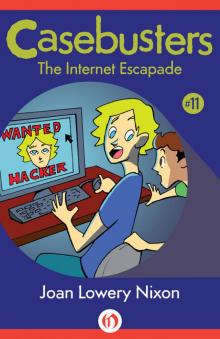 The Internet Escapade
The Internet Escapade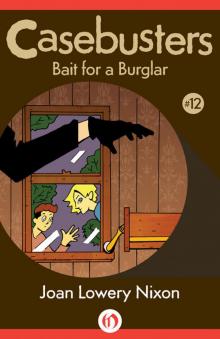 Bait for a Burglar
Bait for a Burglar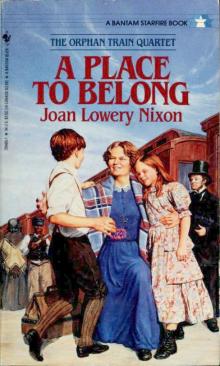 A Place to Belong
A Place to Belong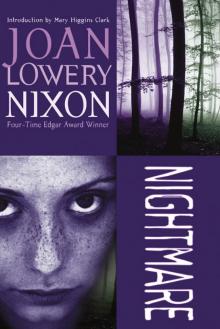 Nightmare
Nightmare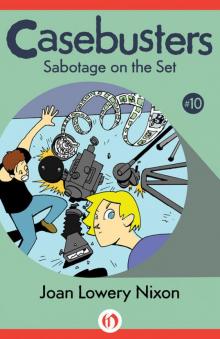 Sabotage on the Set
Sabotage on the Set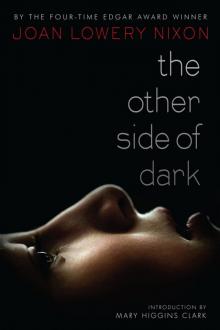 The Other Side of Dark
The Other Side of Dark Whispers from the Dead
Whispers from the Dead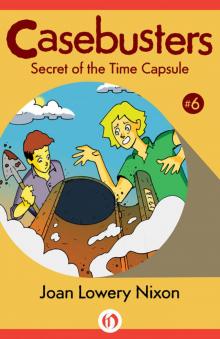 Secret of the Time Capsule
Secret of the Time Capsule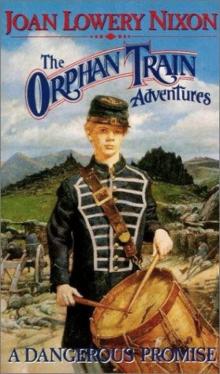 A Dangerous Promise
A Dangerous Promise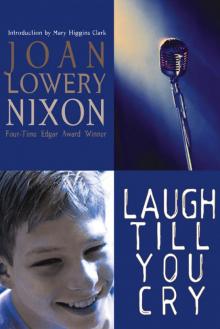 Laugh Till You Cry
Laugh Till You Cry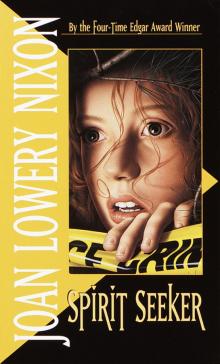 Spirit Seeker
Spirit Seeker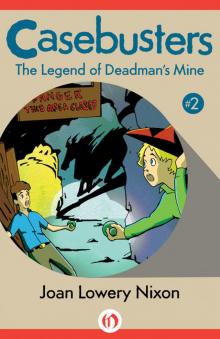 The Legend of Deadman's Mine
The Legend of Deadman's Mine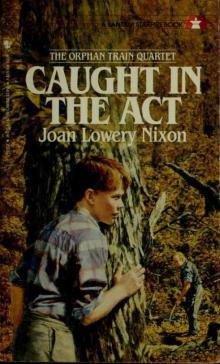 Caught in the Act
Caught in the Act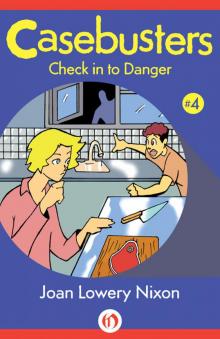 Check in to Danger
Check in to Danger Ellis Island: Three Novels
Ellis Island: Three Novels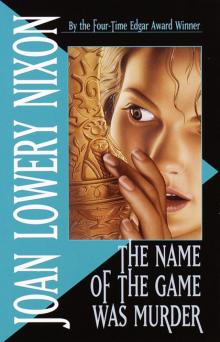 The Name of the Game Was Murder
The Name of the Game Was Murder The Haunting
The Haunting Lucy’s Wish
Lucy’s Wish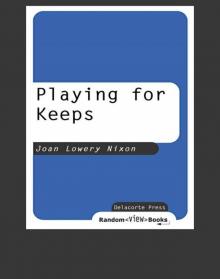 Playing for Keeps
Playing for Keeps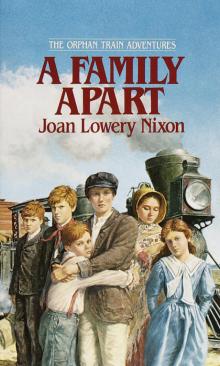 A Family Apart
A Family Apart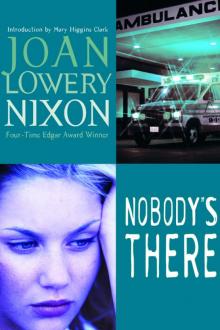 Nobody's There
Nobody's There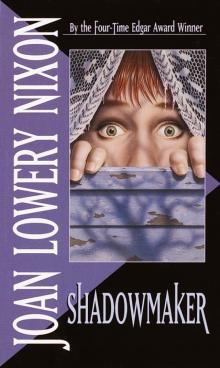 Shadowmaker
Shadowmaker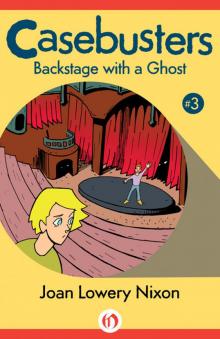 Backstage with a Ghost
Backstage with a Ghost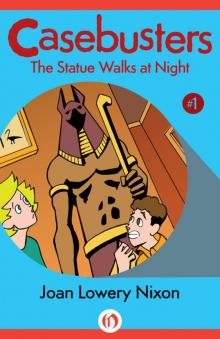 The Statue Walks at Night
The Statue Walks at Night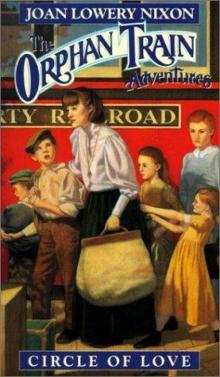 Circle of Love
Circle of Love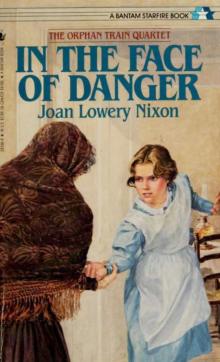 In the Face of Danger
In the Face of Danger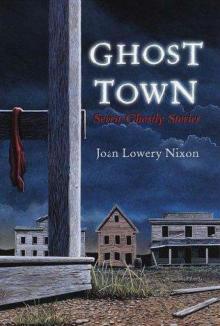 Ghost Town
Ghost Town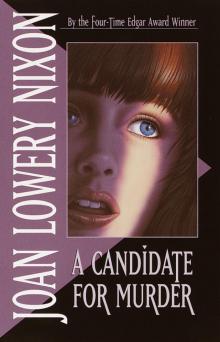 A Candidate for Murder
A Candidate for Murder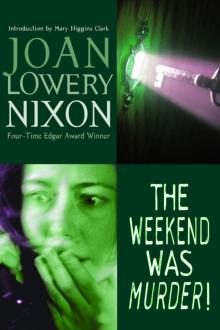 The Weekend Was Murder
The Weekend Was Murder The Island of Dangerous Dreams
The Island of Dangerous Dreams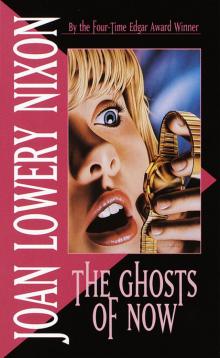 The Ghosts of Now
The Ghosts of Now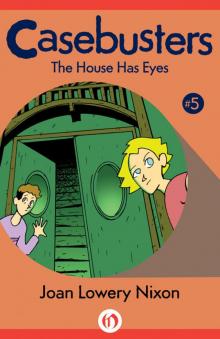 The House Has Eyes
The House Has Eyes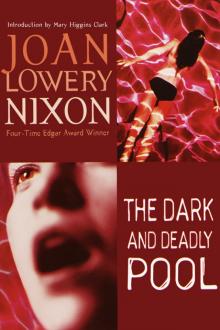 The Dark and Deadly Pool
The Dark and Deadly Pool Keeping Secrets
Keeping Secrets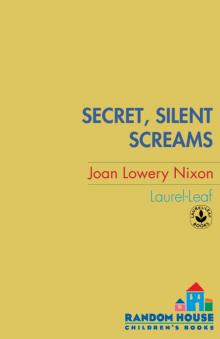 Secret, Silent Screams
Secret, Silent Screams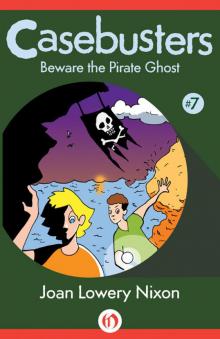 Beware the Pirate Ghost
Beware the Pirate Ghost Search for the Shadowman
Search for the Shadowman Haunted Island
Haunted Island